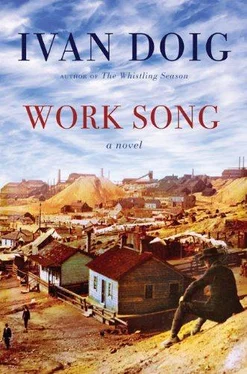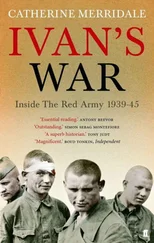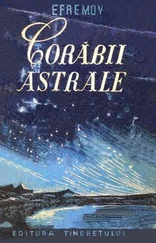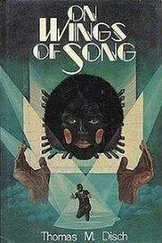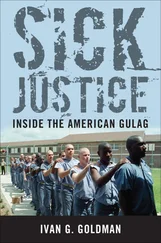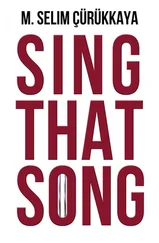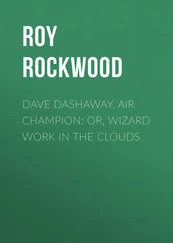As the group dispersed, I stood by numbly, still jolted by Jared’s fervent promise to assemble two hundred miners here in a library space where they were not supposed to assemble at all. Knowing perfectly well that if I asked him, “How?” the reply was going to be, “Professor, I leave that to you.”
Quinlan passed by me with a troublesome grin, humming to himself. That tune at least was unmistakable. “Same song, second verse. / Could get better, but it’s gonna get worse.”
WHEN I CLOSED UP THE LIBRARY, Rab and Jared were waiting for me down on the steps. “Come with us to the Purity for pie,” he invited, direct even when he was being pleasant. “I’ll even buy.”
I joined them, and the sound of our footsteps was our only company on the lamplit streets. Of course Rab had a dozen enthusiasms about what the sought-after song should be like, and Jared winnowed those in his wry fashion. I contributed what I could, although my head was a swirl. A crowd of a couple hundred, to get past the police, the goons, and, perhaps most consequential, Samuel Sandison, without attracting attention? My mind went back and forth over this, which simply dug the problem in deeper. My mood was not helped when we passed the Daily Post building and I saw that even the so-called autumn classic, the World Series, was jinxed this wayward year; the scoreboard being set up for the forthcoming games announced the Chicago White Sox-Skinner would crow to me unmercifully-versus the Cincinnati Red Stockings, as purists knew the team that sports pages habitually shrunk to the Redlegs or Reds. The Anklet Series, I thought of it with disgust. Where were the teams with good sound contentious names, Cubs, Tigers, Pirates? When even baseball starts to go downhill, I grieved, there’s no telling what will follow.
My brooding spell was broken by Jared as we neared the cafeteria. He tugged at his short ear as he did when thinking hard, and Rab attentively shut up. Looking around to make sure we couldn’t be overheard, he said in a voice low but firm:
“Just so you know, Professor. The Hill might have to go on strike, maybe pretty damn quick.”
I hoped his wording was a slip of the tongue. “Another work action, you mean.”
“That’s the farthest thing from what he means, Mr. Morgan,” said Rab.
“She’s right as usual,” Jared acknowledged, giving her a wink. He was all seriousness as he turned to me again. “We’ve negotiated until we’re blue in the face, and Anaconda still won’t meet us halfway on anything that counts. Worse than that, those of us on the council have a hunch the company is getting ready to cut the dollar off the wage again. If that happens,” his tone became even more resolved, “we won’t have any choice. The union will either have to curl up and die or call a strike.” In the streetlight there outside the cafeteria, I saw Jared square his shoulders as he looked up at the lights of the Hill and listened for a moment to the drivewheel sound of the mines at work. In another battle, of another sort, he must have sized up Dead Man’s Hill similarly before the attack up the slope. Now he shifted his gaze to the slumbering city around us. “It’s always tough on the town, to shut everything down,” he said solemnly. “But Butte has been through strikes before. They’re part of life here. Everybody understands it’s our only way to fight back against Anaconda.”
“Jared, I must know,” another apprehension creeping up on me, “how quick is pretty damn quick?”
“After the next payday, more than likely. Doesn’t leave you any too much time, does it.”
I blanched. That soon? To come up with the union song necessary to rally his forces? From an aggregate of miners who didn’t agree on anything musically except the sublime charm of the concertina?
Jared nodded as if reading my mind. “I know it’ll take some doing. But we’ll need all the ammunition we can get when the strike comes.” He touched my shoulder. “The song counts for a lot, Professor. I want it in the head of every miner on the Hill, to hold us together.”
“Inspiration follows perspiration, you did say, Mr. Morgan,” Rab contributed all too helpfully.
At least one thing stayed the same in the Butte night: the owner of the Purity with a glad cry ushered us in to serve ourselves.
THUS, there was everything but library business on my mind during business hours at the library the following day. Which may explain the next thing to happen. My thoughts elsewhere, I was on my way between one chore and another in a rear hallway when a shadow not my own loomed on the wall beside me. In a fit of panic, I whirled and put my back against the wall, digging with both hands for my brass defenders.
“Famine!” I exhaled with relief. “You surprised me a little.”
“Didn’t mean to spook you.” He handed me an envelope. “Told me you wanted to see anything with Shycago on it.”
I glanced at the Chicago postmark and the kind of chill that supposedly occurs when some creature of the night treads across one’s gravesite came over me.
“Have yourself some ice cream,” I rewarded my trustworthy messenger with enough money for a vat of it, “and then come back.” He vanished in leaps and bounds, and I trotted downstairs to the auditorium. The Theosophists’ electric tea kettle steamed the envelope open quite nicely.
Two pieces of paper shook out, dire as loaded dice.
“There’s goods to be got on anybody, sucker.” Eel Eyes’ parting shot resounded in me like a cannonade as I examined the sheets one by one. You should never underestimate even the most thick-headed adversary. The goons had been a lot more determined to get something on me than I imagined. Who knew how many underworlds they’d had to try, but they hit pay dirt in a certain den of high rollers beside Lake Michigan. What I was holding was a print of the photograph from Miners Day, Grace and myself frozen-faced as missionaries with the splendor of Columbia Gardens around us. My head was circled in red crayon like a target.
The letter that came with was even worse.
“Photo you sent is positive identification: real name Morgan Llewellyn. Capture him and deliver him to us. We have an old score to settle.”
There was more, but that told the story. The Chicago gambling mob did not forgive; it never even forgot. Like hounds stirred from sleep by an old hunting scent, the betting sharpies were roused all over again about Casper’s last fight and our winnings, and I had to act fast.
Reflex and logic agreed on the same piece of advice: take the next train out of town. Put all possible distance between the contents of the envelope and myself. But that left Grace, literally in the picture next to me, and in for nasty interrogation by Eel Eyes and Typhoon if I wasn’t available. Besides, if I fled now I would be leaving other loose ends flapping in this Butte chapter of life, and that would bother me for the rest of my days.
With the troublesome pieces of paper tucked inside my suitcoat, I made my way upstairs to the mezzanine, thinking as hard as it is possible to think. Rab had gone out with an armload of books for appraisal by the antiquarian dealer; that helped. And further luck: Sandison was down there in the Reading Room, trying to deal with Miss Runyon, highly indignant over something, and would have his hands full for a while. My path was clear, and indicatively it led through an aisle of fiction. Passing through the ranks of Twain and Defoe and the others as I slipped into the office, I was in the company of those who best knew that a greater truth can sometimes be told by making things up. And those wise old heads did not even have my magic kit to work with, the typewriter and fountain pen.
I had two envelopes waiting for Famine to deliver when he scampered back. In the one from Chicago, the goons now were informed in nice fresh typing with a copied signature that, alas, this was a case of mistaken identity, no one back there had ever laid eyes on the nobodies in the photo. In the one to go into the mail to Chicago, the gambling mob was notified that, regrettably, its message had arrived too late, the miscreant Morgan Llewellyn had vanished from Butte.
Читать дальше
